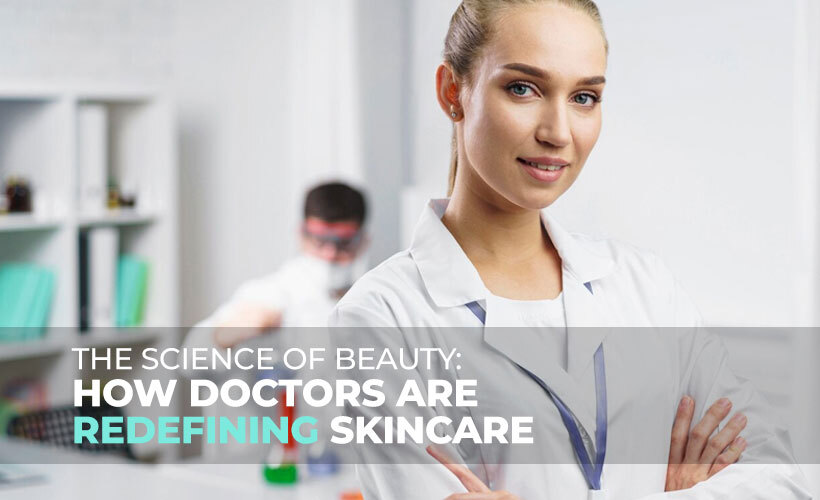Skincare has changed a lot over time. In the past, it was mostly about basic things like cleaning and moisturizing. But today, skincare is much more advanced. It is a mix of art and science, using the latest medical knowledge and technology.
What used to be just about beauty products is now also about science. Doctors and skincare experts use their knowledge to create better, more personalized treatments that help keep our skin healthy.
Doctors, including dermatologists, cosmetic surgeons, and researchers, are leading the change in skincare. They do more than just recommend creams. In fact, they are creating treatments that go deep into the skin. These treatments help fix the real causes of skin problems and give people results that last a long time.
1. Intersection of Science and Skincare
Skincare with the latest trends is beyond surface-level care; it’s about applying science to skincare in unimaginable ways.
From Traditional to Scientific
For many years, skincare was all about basic steps: cleanse, tone, and moisturize. These routines worked for some people, but as scientists started to learn more about how skin functions, things began to change. Doctors and researchers began to study how skincare products affect the skin at a deeper, cellular level. This research helped create more targeted treatments based on real science. Now, skincare is not just about looking good on the outside; it is about improving skin health from the inside out.
Why Doctors Matter in Skincare
Today, doctors play a big role in skincare. Unlike the products you find on store shelves, which are made for everyone, doctors can create treatments that are just right for you. By using their expert knowledge of skin, dermatologists can make personalized skincare plans based on your skin type, concerns, and goals. With their help, you are more likely to see real, long-lasting results. Plus, you can avoid common skincare myths and find out what really works for your skin.
2. Key Ingredients of Science-Backed Skincare
The significant part of the skincare revolution is the introduction of science-backed ingredients that work to improve skin at cellular level. Dermatologists and skincare experts often stress about how important it is to use ingredients that give both quick results and long-lasting benefits. This way, your skin can look good right away and stay healthy over time. Below are some of the most important ingredients in today’s skincare products:
Retinoids: Retinoids, like retinol, are vitamin derivatives that help stimulate collagen, speed up skin cell turnover, and reduce wrinkles, acne, and dark spots.
Peptides: Peptides are short chains of amino acids that help firm the skin by promoting collagen production. They also improve skin elasticity and reduce sagging.
Hyaluronic Acid: This ingredient is a powerful moisture magnet that pulls water into the skin, keeping it hydrated and plump.
Antioxidants: Ingredients like Vitamin C, Vitamin E, and niacinamide help protect the skin from damage while also brightening the skin tone and reducing pigmentation.
These ingredients are backed by clinical research and are used by doctors to achieve real, long-lasting results.
Medical-Grade Technology
Technology plays a major role in modern skincare beyond the topical ingredients. Medical-grade treatments like laser treatments, microneedling, and chemical peels work on the skin more deeply. These treatments help with problems like acne scars, uneven skin tone, and signs of aging.
In addition, new technologies are helping doctors and patients even more. For example, AI-powered skin analysis tools can now look at your skin closely and help doctors understand your skin better. This allows for skincare treatments that are made just for you, making them more effective and personal.
3. Popular Medical Skincare Treatments and Procedures
Some of the most popular medical skincare treatments include injectables and fillers, laser treatments, chemical peels, microneedling, and non-surgical facelifts.
Injectables and Fillers
Injectable treatments, like Botox and dermal fillers, are popular and easy to access. These treatments are used by dermatologists and plastic surgeons to improve the shape of the face, treat acne scars, and restore volume to areas affected by aging.
Laser treatments
Laser treatments have completely changed the way we treat different skin problems, such as acne scars and sun damage. Lasers like fractional CO2 and IPL (Intense Pulsed Light) work by encouraging the skin’s natural healing. These non-invasive treatments help your skin make more collagen, improving its texture and tone.
Microneedling & chemical peels
Microneedling creates tiny punctures in the skin, which helps boost collagen production, while chemical peels exfoliate and refresh the skin. Both treatments help your skin regenerate, reducing signs of aging, acne scars, and uneven texture.
Non-surgical facelifts & tightening
Advancements in non-invasive procedures like Ultherapy and HIFU (high-intensity focused ultrasound) have made it possible to lift and tighten the skin without surgery. These treatments work by boosting the production of collagen and elastin deep inside the skin. As a result, they help lift sagging areas and reduce the appearance of fine lines.
4. Role of Doctors in Redefining Skincare
Doctors today are taking a much more active role in skincare. They do more than just prescribe medications. With new discoveries in dermatology, skin specialists and researchers are leading the way in creating personalized skincare solutions. These solutions are made to meet each person’s unique needs, helping them get the best results for their skin.
Personalized Skincare
Instead of relying on generic products, doctors now design skincare regimens customized to each person’s skin type, concerns, and lifestyle. Whether you’re dealing with acne, signs of aging, or dark spots, doctors can make a special plan for you. This plan combines creams and treatments with advanced procedures to give you long-lasting and effective results.
Genetic and Biometric Profiling
The increasing growth in genetic and biometric profiling allows doctors to create skincare solutions based on individual genetic makeup and skin condition. Genetic testing uncovers predispositions to conditions like premature aging or acne and assists doctors in recommending the most precise treatments for each patient.
Custom Compounding
Doctors can also create custom skincare formulas to solve multiple skin problems at once. This is important because it makes sure the treatment is effective and fits your skin’s needs, without unnecessary ingredients like fillers or allergens. This is especially helpful for people with sensitive or complex skin.
5. Safety and Efficacy of Skincare Treatments
With the growing demand for advanced skincare treatments, it is essential to choose options that are both safe and effective. Doctors are committed to offering treatments backed by science that have been proven through clinical trials and FDA approvals, helping to minimize risks while maximizing results.
6. Future of Skincare
Looking ahead, the future of skincare is incredibly promising. Doctors and researchers are exploring regenerative treatments like stem cell therapy, gene therapy, and AI-driven skincare solutions to address skin concerns on a deeper level. In the near future, it is expected to get personalized treatments that can prevent aging, reverse damage, and promote long-term skin health. With ongoing research and innovation, the future of skincare looks brighter than ever.
Conclusion
Skincare is no longer just about aesthetics nowadays. Doctors and medical professionals are now able to offer treatments that improve both the health and appearance of your skin. With scientifically backed ingredients, advanced procedures, and personalized regimens, skincare is becoming more effective, targeted, and accessible.
If you are serious about your skincare and need help, one of the best options is
professional healthcare staffing agency near me where medical professionals will help you achieve lasting and effective results.


